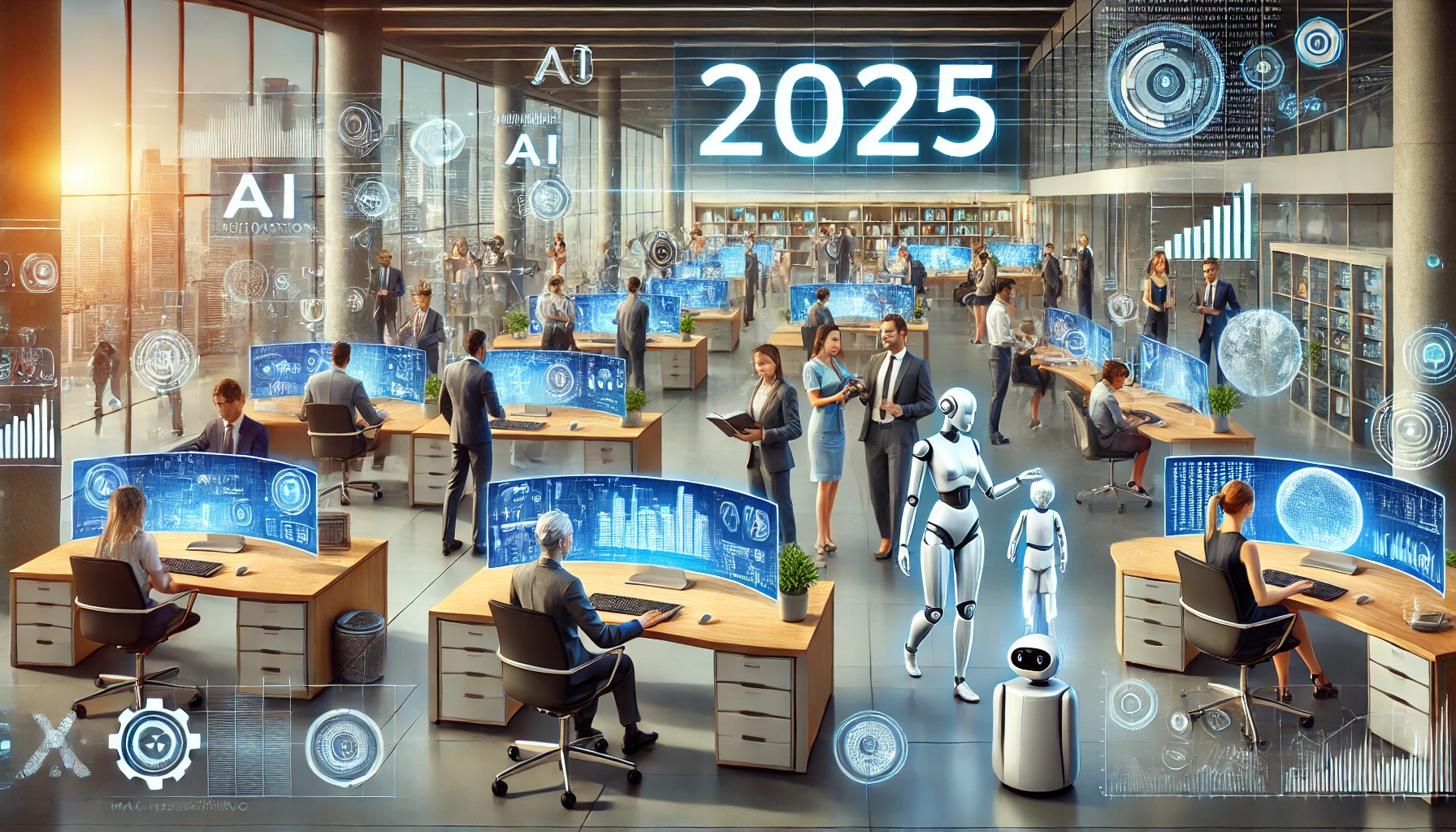Artificial Intelligence (AI) is when machines or computers are designed to think and learn like humans. These machines can make decisions, recognize things, and solve problems on their own.
AI is already part of our daily lives, like when we use voice assistants (e.g., Siri) or get movie recommendations.
There are two types of AI:
- Narrow AI: AI focused on one task, like translating languages or recognizing faces. This is what we use most today.
- General AI: AI that can do any intellectual task a human can do, but it’s not here yet.
AI works by using algorithms to analyze data and learn from it, so it can make better decisions in the future.
How AI Is Changing the Job Market
AI is having a big impact on jobs. Here’s how it’s changing the world of work:
1. Job Automation
AI can take over repetitive tasks that people used to do, like answering calls or driving vehicles. For example:
- Self-driving cars could replace truck drivers.
- AI chatbots can handle customer service without human help.
2. New Job Creation
While some jobs are disappearing, AI is also creating new ones. These include:
- AI specialists and data scientists to build and improve AI systems.
- AI trainers to teach machines how to perform tasks.
3. Changing Skill Requirements
AI is making certain skills more important. Jobs will need people who can work with technology, like programming and data analysis. For example:
- Doctors might use AI to help diagnose diseases.
- Teachers could use AI to enhance their lessons.
4. AI Helping Humans
AI isn’t just replacing people, it’s also making jobs easier. For example:
- In medicine, AI can help doctors spot problems in X-rays.
- In finance, AI helps analysts make smarter decisions faster.
5. Job Displacement
AI might cause some jobs to disappear, and this could lead to challenges, like people losing their jobs if they can’t learn new skills. It’s important for workers to adapt and for businesses to support training programs.
6. Global Workforce Shifts
AI is changing jobs worldwide. Some countries with advanced AI technologies will have more high-tech jobs, while others may fall behind. This will require education systems to adapt and train people for new types of work.
In short, AI is changing the job market by creating new opportunities and challenges. While it can replace some jobs, it can also make jobs better and more efficient, allowing humans and machines to work together.
How AI is Already Changing Jobs Today
AI is already influencing the way we work in many industries. It’s making tasks easier, more efficient, and sometimes even replacing certain jobs. Here’s how AI is changing jobs right now:
Examples of AI in Workplaces
- Customer Service: Many businesses are using AI chatbots to handle customer queries. These bots can answer questions, help with bookings, and provide 24/7 support without the need for human agents.
- Healthcare: AI is helping doctors by analyzing medical data, like X-rays, to detect health conditions earlier. AI-powered tools can even suggest possible diagnoses or treatment plans.
- Manufacturing: In factories, AI robots are being used to automate repetitive tasks such as assembling parts or packaging products. This increases production speed and reduces human error.
- Retail: AI helps online stores personalize shopping experiences by recommending products based on past purchases. AI inventory systems can also predict demand and optimize stock levels.
- Finance: AI algorithms are used by banks to analyze financial data, spot fraud, and even help with stock trading. It can process vast amounts of data much faster than humans.
Industries Most Affected by AI
Some industries are being impacted more by AI than others. Here are a few:
1. Manufacturing
AI is automating many tasks in factories, such as assembly, quality checks, and packaging. Robots powered by AI are working alongside humans, making production faster and more cost-effective.
2. Healthcare
AI is changing healthcare by assisting with diagnosis, personalizing treatment plans, and improving patient care. AI-powered tools help doctors make better decisions by analyzing large amounts of medical data.
3. Retail and E-commerce
AI is being used to personalize shopping experiences by suggesting products based on customer behavior. AI also helps with inventory management, pricing strategies, and customer service.
4. Transportation
In the transportation industry, AI-powered vehicles (self-driving cars and trucks) are set to revolutionize how goods and people are moved. AI is already being used for route planning and delivery optimization.
5. Finance
AI is transforming finance by automating tasks like fraud detection, risk management, and customer support. AI helps banks process transactions quickly, detect fraud patterns, and make investment decisions.
6. Customer Service
Many customer service departments now rely on AI to provide instant support. Chatbots can handle routine questions, allowing human agents to focus on more complex tasks. AI is also used in call centers to predict customer needs and improve service quality.
What to Expect from AI in 2025
By 2025, AI is expected to have an even bigger impact on our lives and jobs. Here’s what we might see:
Major Changes in Jobs by 2025
- Job Automation at a Larger Scale: More industries will see tasks automated, from customer service to logistics. Routine jobs like data entry, telemarketing, and assembly line work could be almost entirely taken over by AI and robots.
- Rise of AI-Related Jobs: As AI grows, there will be an increased demand for AI specialists, data scientists, machine learning engineers, and AI ethicists. These roles will be critical for developing and maintaining AI systems.
- Upskilling and Reskilling: Many existing jobs will require workers to adapt by learning new skills, particularly in tech and AI. This will lead to widespread reskilling programs, as people need to understand how to work with AI tools and technology.
- Hybrid Work Environments: AI will help create flexible and hybrid work environments. Tools powered by AI will support remote work, collaboration, and productivity, allowing employees to work more efficiently from anywhere.
- AI-Driven Decision Making: By 2025, businesses will rely even more on AI to make critical decisions in real time. AI systems will analyze data and provide insights that help leaders make faster and more accurate business decisions.
Top AI Tools and Technologies Coming in 2025
- AI-Powered Personal Assistants: Personal assistants like Siri or Google Assistant will become even more advanced, understanding context better and handling more complex tasks. These assistants could help with scheduling, answering emails, and managing tasks automatically.
- Autonomous Vehicles: Self-driving cars and trucks will become more common on roads, especially in logistics and delivery. AI will enable vehicles to navigate complex environments safely, reducing the need for human drivers.
- AI-Enhanced Healthcare Tools: AI will be used more in medicine for things like predicting diseases, personalized treatment, and surgical assistance. AI-powered diagnostic tools could even become a regular part of healthcare services, improving accuracy and efficiency.
- AI in Creative Fields: AI tools for graphic design, music composition, and content creation will become more sophisticated, allowing artists and creators to collaborate with AI to produce unique works. For example, AI-generated art and music will become more prevalent.
- AI-Powered Cybersecurity: As cyber threats grow, AI will play a key role in identifying and preventing cyberattacks in real time. AI systems will automatically detect unusual behavior, block malicious activity, and protect sensitive data.
- Natural Language Processing (NLP) Advancements: NLP technology will improve, allowing computers to understand and generate human language even better. This could lead to more effective chatbots, virtual assistants, and real-time translation tools.
- AI-Driven Manufacturing and Robotics: AI-powered robots will be used to manage production lines, perform quality control, and even collaborate with human workers in real-time. This will make factories more efficient and reduce costs.
Jobs That Will Be Automated by AI
As AI continues to advance, many jobs that involve repetitive tasks or require less human interaction are at risk of automation. Here are some types of jobs likely to be automated:
1. Customer Service Roles
AI-driven chatbots and virtual assistants can handle customer inquiries, complaints, and troubleshooting tasks 24/7, reducing the need for human customer service representatives. These AI systems are improving quickly and can manage common queries, leaving more complex issues for human agents.
2. Data Entry and Administrative Jobs
Jobs that involve manual data entry, sorting documents, and managing records are highly vulnerable to automation. AI and robotic process automation (RPA) can quickly and accurately process large amounts of data, making administrative tasks more efficient and reducing the need for human involvement.
3. Retail and Cashier Positions
Self-checkout systems, automated inventory management, and online shopping platforms powered by AI are already replacing cashier roles and traditional retail workers. AI systems can track inventory levels, make purchase recommendations, and even process payments, reducing the need for human labor.
4. Transportation and Delivery Jobs
The rise of autonomous vehicles is transforming the transportation industry. Self-driving trucks, delivery drones, and autonomous taxis will reduce the need for truck drivers, delivery drivers, and taxi drivers in the near future. AI can manage the logistics and route planning for these vehicles, improving efficiency and reducing human errors.
5. Manufacturing and Assembly Line Jobs
In industries like automobile manufacturing, robots and AI-powered machines are already performing assembly, quality checks, and packaging. These robots work faster and more accurately than humans, leading to fewer job opportunities in traditional manufacturing roles.
6. Financial Services
AI is already taking over many roles in banking and finance, such as analyzing large datasets, detecting fraud, and even providing investment advice through robo-advisors. Human workers may be needed less in areas like financial analysis, loan processing, and risk management, as AI tools become more proficient.
7. Content Creation and Journalism
AI tools are capable of creating news articles, reports, and even creative writing based on given data. For example, AI can automatically write sports reports, financial summaries, or even generate product descriptions for e-commerce. These tools are improving in quality, posing a threat to entry-level content creation jobs.
Which Jobs Are at Risk?
Jobs that involve repetitive, predictable tasks or routine manual work are most at risk of automation. Some of the key categories include:
1. Low-Skill, Repetitive Jobs
Positions that don’t require advanced education or creativity, such as fast-food workers, telemarketers, and cleaners, are more likely to be automated. AI-powered robots and machines can perform these tasks more efficiently.
2. Middle-Skill Jobs
These jobs require specialized knowledge but not complex decision-making. Examples include certain office administrative roles, retail workers, and drivers. AI and robotics will increasingly take over middle-skill tasks, leading to significant job displacement.
3. Routine-Based Jobs
Jobs in sectors like transportation, manufacturing, and logistics that involve following a set of rules or predictable patterns are vulnerable to AI-driven automation. For instance, warehouse workers and assembly line operators are at risk as robots can perform tasks more quickly and without breaks.
How to Prepare for Automation
To stay competitive in a future where automation is more widespread, individuals need to adapt and build skills that are difficult for AI to replicate. Here’s how to prepare for automation:
1. Focus on Human Skills
AI is great at handling routine tasks, but it still struggles with tasks that require emotional intelligence, creativity, critical thinking, and human interaction. Focusing on skills that require problem-solving, leadership, and empathy will make you more valuable in a world with automation. Key skills to develop include:
- Communication: Being able to collaborate and share ideas effectively with colleagues, clients, and customers.
- Creativity: Working in fields like marketing, design, and art, where creative problem-solving is key.
- Emotional Intelligence: Being able to understand and manage emotions in yourself and others, especially in roles like management and customer service.
2. Upskilling and Reskilling
Continuously learning new skills is essential in an AI-driven economy. Take online courses, attend workshops, or pursue certifications in tech-related fields such as data science, AI programming, machine learning, and cybersecurity. Upskilling in areas like digital literacy, coding, and data analysis will give you an edge in the workforce.
3. Embrace Technology
Learn to work alongside AI tools and machines. Many industries will require humans to use AI for better efficiency, so gaining experience with AI-powered platforms in your field is important. For example, learning how to use AI for automation in finance, machine learning in healthcare, or AI tools for marketing will set you apart from those who resist the technology.
4. Adapt to Emerging Industries
As some jobs become obsolete, new industries and job roles will emerge. Fields like AI ethics, robotics, renewable energy, and AI healthcare are likely to see significant growth. Look for opportunities in these emerging areas, where human expertise will be required to work with advanced technology.
5. Be Flexible and Open to Change
The job market is rapidly evolving, so having a flexible mindset is crucial. Be open to new opportunities, roles, or even career shifts. You may need to pivot into a new field or take on a different type of work that didn’t exist a few years ago.
In summary, jobs that are repetitive, routine-based, or low-skilled are most at risk of being automated. However, by focusing on human-centered skills, continuously upskilling, embracing AI tools, and adapting to emerging industries, you can prepare yourself for the changing job market and stay relevant in the face of automation.
How AI Will Improve Your Work-Life Balance
AI is helping people achieve a better work-life balance by automating tasks, improving efficiency, and giving them more time for personal activities. Here’s how AI can support your daily routine:
1. Task Automation
AI can handle repetitive and time-consuming tasks, such as data entry, scheduling meetings, or sorting emails. By automating these tasks, AI frees up your time for more important work or personal activities.
2. Personalized Productivity Tools
AI can offer smart productivity tools that adapt to your work habits. These tools can help prioritize tasks, organize your calendar, and remind you of deadlines, making your work more efficient and less stressful.
3. Improved Communication
AI-powered tools can streamline communication by automatically sorting messages, suggesting responses, or even scheduling meetings. This reduces the mental load of managing messages and keeps you focused on what matters.
4. Better Work Scheduling
AI can analyze your work patterns and suggest optimal work schedules, ensuring that you have a good balance between work and personal time. This means fewer long nights and more time for yourself.
5. Reduced Stress
AI can help reduce stress by handling tasks like planning, reminders, and communication, giving you more mental space to focus on what’s truly important and reducing the pressure of managing everything yourself.
AI Tools to Make Work Easier
Several AI tools can help simplify and enhance your work process. Here are some examples:
1. Email Assistants
AI-powered email assistants like Google’s Smart Compose or SaneBox can sort, prioritize, and even help you draft replies. They can filter out spam, flag important messages, and organize your inbox.
2. Task Management Tools
AI-driven tools such as Trello, Asana, or Notion use smart algorithms to prioritize tasks and deadlines, helping you stay organized without missing anything important.
3. Time Tracking and Scheduling Apps
Tools like Clockify, RescueTime, or Otter.ai help track how you spend your work hours, so you can focus on areas that need improvement. AI can also schedule your meetings based on your availability, helping you avoid overworking.
4. AI Chatbots
AI chatbots like Slackbot or Microsoft Teams AI can automate responses, handle customer queries, and assist with scheduling, making team communication and customer support more efficient.
5. Smart Assistants
Digital assistants like Siri, Alexa, or Google Assistant can help you with voice-activated tasks, from setting reminders to finding information quickly, helping you stay focused on work without distraction.
AI in Managing Time and Tasks
Managing time effectively is one of the key challenges for achieving work-life balance. AI tools are great at improving time management by helping you stay on top of deadlines, tasks, and projects:
1. Automated Task Prioritization
AI can analyze your to-do list and suggest which tasks should be prioritized. It can help you focus on high-impact tasks, preventing you from feeling overwhelmed by a long list of to-dos.
2. Smart Calendar Management
AI can sync your calendar with your tasks and suggest the best times to schedule meetings, focus work, or personal time. AI tools can even remind you when it’s time to take breaks to avoid burnout.
3. Time Blocking
AI can help you schedule your day in blocks of focused work time, ensuring that you’re not multitasking or spreading yourself too thin. By managing your time this way, you can focus on one task at a time, which increases productivity.
4. Task Delegation
AI tools can help you delegate tasks more effectively. With tools like Zapier, AI can automatically assign tasks to team members based on their workload or expertise, reducing your workload and helping your team collaborate more efficiently.
5. Tracking Progress
AI can track your progress on various projects and tasks, giving you insights into your productivity patterns. It can also identify areas where you’re spending too much time and suggest ways to improve your efficiency.
AI in Different Industries: The Changes You Should Expect
AI is transforming industries worldwide, bringing efficiency, innovation, and new opportunities. Here’s how AI is impacting key industries and the changes you should expect:
1. Healthcare
AI is revolutionizing healthcare by improving diagnostics, personalizing treatment plans, and automating administrative tasks. Here’s what to expect:
- Faster Diagnostics: AI can analyze medical images, such as X-rays or MRIs, more quickly and accurately than humans, helping doctors detect diseases early.
- Personalized Medicine: AI can analyze a patient’s genetic information and recommend personalized treatment plans.
- Robotic Surgery: Robots powered by AI will assist surgeons in performing more precise and minimally invasive procedures.
2. Education
In education, AI is enhancing learning experiences and improving administrative efficiency:
- Personalized Learning: AI-driven platforms adapt to individual learning styles and speeds, providing students with a tailored education.
- Virtual Teachers: AI can assist in tutoring, answering questions, and providing additional help to students outside of class hours.
- Automating Grading: AI can help teachers grade assignments and tests quickly, freeing up more time for student interaction.
3. Finance
AI is changing how financial institutions operate by automating tasks, analyzing data, and providing insights:
- Fraud Detection: AI can analyze transaction data in real time to detect fraudulent activity and reduce financial crimes.
- Investment Strategies: AI can analyze vast amounts of market data to predict trends and help investors make informed decisions.
- Customer Service: AI chatbots are handling customer inquiries and providing financial advice, reducing wait times for customers.
4. Manufacturing
In manufacturing, AI is enhancing production efficiency and reducing downtime:
- Predictive Maintenance: AI monitors equipment and predicts failures before they happen, reducing downtime and costs.
- Smart Factories: AI systems optimize production processes, manage supply chains, and ensure the quality of products.
- Robotic Automation: AI-powered robots are improving assembly lines, enhancing productivity, and performing tasks that are dangerous for humans.
5. Retail
AI is transforming the retail experience by personalizing shopping, improving customer service, and streamlining logistics:
- Personalized Recommendations: AI analyzes consumer behavior to provide personalized product recommendations in real time.
- Inventory Management: AI helps retailers predict demand and manage stock more efficiently, reducing waste.
- Customer Service Chatbots: AI chatbots assist customers with questions, product inquiries, and order tracking.
Industry-Specific Examples of AI Advancements
Here are more detailed examples of how AI is making a difference in various industries:
- Healthcare: AI is being used in drug discovery, predicting patient outcomes, and creating personalized health plans. AI-based tools like IBM Watson Health are analyzing patient data to suggest treatments.
- Education: AI in education platforms like Duolingo personalizes learning based on students’ progress, making it easier for learners to master new skills.
- Finance: Robo-advisors like Betterment use AI to help investors manage their portfolios based on risk preferences and market trends.
- Manufacturing: Companies like Siemens are using AI to optimize production lines by predicting maintenance needs and improving quality control.
- Retail: Amazon uses AI to manage its vast warehouses, with robots that pick and pack orders, while AI-driven systems recommend products based on purchase history.
Preparing for AI in Your Career
As AI continues to grow, it’s essential to stay ahead by upskilling and embracing new opportunities. Here’s how you can prepare:
1. How to Upskill and Stay Relevant
To stay relevant in the evolving job market, you should focus on acquiring new skills that align with AI developments:
- Learn AI and Machine Learning: Understanding AI concepts like machine learning, deep learning, and neural networks is valuable. Platforms like Coursera, edX, and Udemy offer courses.
- Develop Data Science Skills: Knowing how to analyze and interpret data is key. Learn data analysis tools like Python, R, and SQL.
- Improve Soft Skills: As AI takes over routine tasks, human skills like critical thinking, creativity, and problem-solving will be in high demand.
- Embrace Automation Tools: Familiarize yourself with AI tools in your industry to increase productivity and efficiency.
2. The Importance of AI Knowledge in Today’s Job Market
AI knowledge is becoming a crucial part of many job roles across industries. Whether you work in healthcare, finance, marketing, or manufacturing, understanding how AI works can give you a competitive edge.
- Increased Demand for AI Skills: AI is driving demand for tech professionals, but AI knowledge is also important for non-tech roles. Understanding AI can help in decision-making, project management, and even customer service.
- Higher Pay and Opportunities: Professionals with AI expertise are highly sought after, and their salaries are increasing. For example, AI engineers, data scientists, and AI consultants are among the highest-paid professionals in tech.
- Future-Proofing Your Career: By learning AI-related skills, you can ensure your career is resilient against automation. AI will change the way jobs are performed, and those who understand it will have a clear advantage.
Challenges and Concerns of AI in the Workplace
As AI continues to change the workplace, several challenges and concerns arise. These include job displacement, ethical issues, and the need for employee adaptation. Understanding these challenges is key to successfully navigating AI integration.
1. Potential Risks of AI and Job Loss
One of the primary concerns about AI in the workplace is the potential for job displacement. AI has the ability to automate repetitive and manual tasks, which can result in certain jobs becoming obsolete. While AI can create new jobs, there’s uncertainty about how quickly workers can transition into these new roles.
- Automation of Routine Tasks: Jobs that involve repetitive tasks like data entry, customer service, and assembly line work are at higher risk of automation.
- Job Displacement: Workers in industries like manufacturing, retail, and logistics may be affected as AI systems take over tasks that were once done by humans.
2. How to Address These Challenges
To address the challenges posed by AI, there are several strategies that businesses, workers, and governments can implement:
- Reskilling and Upskilling: Businesses should invest in training programs that help workers develop new skills in areas like AI, data analysis, and programming.
- Ethical AI Development: Companies should prioritize ethical AI development to ensure fairness, transparency, and accountability in how AI is used.
- Job Creation Initiatives: Governments and industries should collaborate to create new job opportunities, particularly in sectors that will grow due to AI advancements, such as tech, AI development, and healthcare.
- Human-AI Collaboration: Emphasize roles where humans work alongside AI, focusing on tasks that require creativity, empathy, and complex decision-making, areas where AI still has limitations.
Conclusion: Embracing AI for a Better Future of Work
AI is not just a tool; it is a partner that can help workers improve their productivity, creativity, and job satisfaction. While there are challenges, the future of work with AI looks bright if we embrace the technology and use it to enhance human abilities.
1. Why AI Will Be Your Partner, Not Your Competitor
Rather than replacing workers, AI is most effective when it is used to assist and collaborate with people. It can handle repetitive tasks, allowing humans to focus on more creative, strategic, and emotionally complex aspects of work. By working together, AI and humans can achieve more than either could alone.
- Collaboration over Competition: AI can free up time for workers to engage in higher-value tasks, such as problem-solving, innovation, and customer relationship management.
- Enhanced Creativity: With AI handling mundane tasks, employees have more time to explore creative solutions and generate new ideas.
2. The Bright Future of Work with AI
The integration of AI in the workplace presents exciting opportunities for growth, efficiency, and job creation. Rather than fearing AI, workers and companies should focus on how it can enhance their capabilities and improve outcomes.
- Increased Efficiency: AI can improve operational efficiency by automating routine tasks, allowing workers to focus on more meaningful and impactful work.
- Personalized Work Experiences: AI can help tailor work environments and roles to individual strengths, making work more fulfilling and better suited to personal preferences.
FAQs About AI in the Workplace
1. Is AI Taking Over All Jobs?
No, AI is not taking over all jobs. While AI may automate certain tasks, it will also create new opportunities in areas like AI development, data science, and job roles that require emotional intelligence, creativity, and complex decision-making. AI is best seen as a tool to augment human abilities, not replace them.
2. How Do I Start Learning About AI?
You can start learning about AI by taking online courses, reading books, or exploring tutorials and webinars. Some great platforms for beginners include Coursera, edX, Udemy, and Khan Academy. Focus on building a strong foundation in areas like machine learning, data science, and programming languages like Python.
3. Can AI Help Me Be More Productive at Work?
Yes, AI can help improve productivity by automating routine tasks, organizing your schedule, and providing personalized recommendations for how to optimize your time. AI tools like task managers, calendar assistants, and email organizers can free up mental space for more important and creative work.









